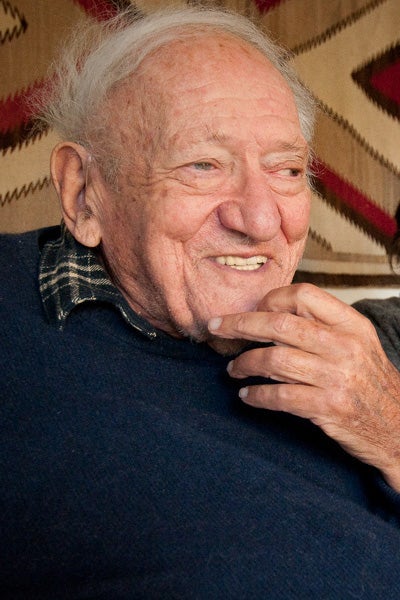Joseph Frank, a professor emeritus of Slavic languages and literatures at Stanford, died Feb. 27 at his home in Palo Alto at the age of 94.

In addition to his scholarship, Joseph Frank is remembered for his willingness to give all ideas full consideration. (Image credit: L.A. Cicero)
A world-renowned literary scholar, Frank was the leading expert on the life and work of famed Russian novelist Fyodor Dostoevsky.
Frank’s five-volume biography (1976-2002) on Dostoevsky has become known not only as the preeminent chronicle of the novelist’s life, but as one of the most important literary biographies of the modern era.
Beyond capturing the details of Dostoevsky’s life as a journalist, thinker and author, Frank analyzed Dostoevsky though the historical lens of 19th-century czarist Russia.
Frank, a scholar of comparative literature, earned the highest honors in his field, including the Modern Language Association’s James Russell Lowell Prize (1977 and 1986) and the Distinguished Contributions Award of the American Association for the Advancement of Slavic Studies (2008).
The 2009 publication Dostoevsky: A Writer in His Time offers an abridged and condensed version of Frank’s original 2,500-page work.
Frank began teaching at Stanford in 1985 and remained an active member of the intellectual community for more than two decades. Even after being named professor emeritus in 1989, Frank remained actively involved in both academic research and teaching. Easily recognizable in his Crime and Punishment baseball cap, Frank visited campus frequently to teach his legendary seminar, Dostoevsky and His Times.
“What I remember most was the intensity and joy with which he went at dissecting characters and incidents, especially from the lesser-known and earlier works,” said Samuel Eisen, a former student who was a teaching assistant for the course several times.
Frank’s dedication as a mentor is evident in the remarkable number of students who have followed in his footsteps. Gregory Freidin, a professor of Slavic languages and literatures, noted that almost every student in the Slavic doctoral program had served as a teaching assistant in Frank’s Dostoevsky seminar. Frank “shaped several generations of the Slavic department’s graduate students, who are now leading their own programs” at universities around the country, Freidin added.
As a teacher, Frank was exceptionally responsive to the input of his students. “He listened attentively to their ideas, often giving their responses more thought and seriousness than the students themselves had,” said Cynthia Haven, a friend and visiting writer at Stanford’s Division of Literatures, Cultures and Languages.
From newspaper editor to literary scholar
After working as a newspaper editor from 1942 to 1950, Frank spent a year as a Fulbright Scholar in Paris, where he belonged to a generation of postwar intellectuals who came to define 20th-century thought.
Upon returning to the United States, he began his academic career with graduate studies at the University of Chicago. After teaching at the University of Minnesota, Rutgers and Harvard, in 1966 he accepted a position as a professor of comparative literature at Princeton, where he was named emeritus in 1983. The following year, he became a fellow at the Stanford Humanities Center; he moved to the Bay Area shortly thereafter.
Outside of Slavic studies circles, Frank is known for his seminal essay on a concept that he dubbed “spatial form.” This important theoretical work suggests that modern writers such as Flaubert, Proust and Pound developed their own characteristic way of representing time.
After its initial appearance in the Sewanee Review in 1945, the essay sparked a critical debate that continued for several decades. In 1991, Frank published a book titled The Idea of Spatial Form to discuss the many issues that other scholars had asked him to consider. This willingness to engage with others and to give all ideas full consideration was one of Frank’s many admirable qualities as an intellectual.
Perhaps what is most remarkable about his contributions to critical theory is how accessible his essays are to lovers of literature outside academia.
“What I remember most about Joe was his kindness, his largeness of spirit and his lack of pretension,” said Haven. “He spoke to everyone as if they were his intellectual equals.”
Frank’s last book, Responses to Modernity: Essays in the Politics of Culture, published in June 2012, is a collection of critical writings that span his career. It addresses literature from a perspective informed by the political landscape of the 20th century, from the Russian Revolution to the problems of postwar Europe.
“He belonged to the era of titanic struggles and was one of the last lone titans himself,” said Freidin. “With his passing, our world feels a diminished place.”
A memorial service will be held at 4 p.m. Monday, May 20, in Levinthal Hall at the Stanford Humanities Center (474 Santa Teresa St.). For further information, contact Denys Roberts at denysr@stanford.edu. A second memorial will be held at Princeton University in October.
Darci Gardner is a doctoral candidate in French and Italian at Stanford.